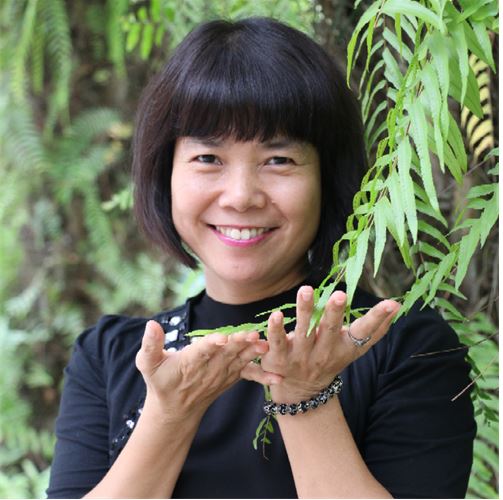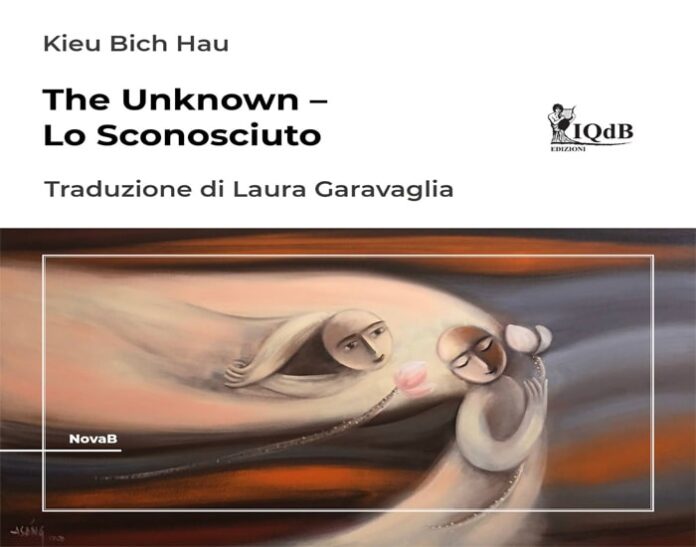Tập thơ ‘The Unknown/Ẩn số’ của tác giả Kiều Bích Hậu – Kỳ 1
The Unknown/ Lo Sconosciuto/ Ẩn số
Tác giả: Kiều Bích Hậu (tiếng Anh)
Dịch giả: Laura Garavaglia (tiếng Ý)
Bùi Xuân (tiếng Việt)
Cùng bạn đọc
Năm 2020, Nhà xuất bản iQdB Edizioni by Stefano Donno (Ý) đã xuất bản tập thơ Ẩn số (The Unknown) của tác giả Kiều Bích Hậu, sáng tác bằng tiếng Anh, và nhà thơ nữ người Ý Laura Garavaglia đã dịch sang tiếng Ý. Vào dịp Tết Nguyên đán Tân Sửu (2021), tập thơ này đã được xuất bản trên vansudia.net với 3 ngôn ngữ Việt, Anh, Ý, trong đó bản tiếng Việt là của dịch giả Bùi Xuân, được hiệu đính bởi chính tác giả tập thơ.
Trong định hướng chung về việc giới thiệu trọn vẹn các tác phẩm văn học trong và ngoài nước trên không gian mạng, lần này, chúng tôi đã tiếp tục trao đổi với tác giả Kiều Bích Hậu nhằm biên tập kỹ thuật, sửa chữa một vài từ trong văn bản cũ và quyết định tái bản tập thơ này theo thứ tự các ngôn ngữ trong mỗi bài thơ: tiếng Anh – ngôn ngữ sáng tác, tiếng Ý và tiếng Việt – ngôn ngữ dịch thuật. Riêng Lời giới thiệu do Nhà thơ, dịch giả Laura Garavaglia viết bằng tiếng Ý, bản dịch tiếng Anh của Annarita Tavani và bản dịch tiếng Việt của Bùi Xuân, nên chúng tôi sắp sếp theo thứ tự: Ý, Anh, Việt. Cũng xin nói thêm rằng, tập thơ Ẩn số do Nhà xuất bản iQdB Edizioni by Stefano Donno ấn hành có 31 bài thơ, khi xuất bản trên vansudia.net tác giả bổ sung thêm 3 bài thơ: Cry (Khóc), Two mooms (Đôi vầng trăng) và Peace (An yên).
Chúng tôi cũng xin chân thành cảm ơn bạn đọc đã quan tâm đến các tác phẩm đã xuất bản: Văn học nghệ thuật & chức năng (lộ trình khám phá đặc trưng bản chất của văn học nghệ thuật) của TS ngữ văn Lâm Vinh, các tập thơ Mùa hái quả, Người thoáng hiện, Bầy chim lạc của Đại thi hào Rabindranath Tagore qua bản dịch của Nhà thơ, Dịch giả Bùi Xuân. Tiếp thu ý kiến của bạn đọc, chúng tôi sẽ bổ sung phần tiếng Anh của các tác phẩm Mùa hái quả và Người thoáng hiện.
Tiếp theo, chúng tôi sẽ giới thiệu trọn tập (3 kỳ) tập thơ Mười ngày 57: Bản chất nước đôi của im lặng (song ngữ Anh,Việt) của Nhà thơ Hungary Halmosi Sándor và Nhà văn, Dịch giả Nguyễn Chí Hoan.
Dịch bệnh viêm đường hô hấp cấp COVID-19 tiếp tục hoành hành. Nhân loại đang trải qua cơn đau đớn lịch sử. Nhưng, chúng ta hoàn toàn có cơ sở để tin tưởng rằng, trên nền tảng y học hiện đại và sự đoàn kết quốc tế, con người có thể đẩy lùi được cơn đại dịch khủng khiếp này trong một tương lai gần. Trong nỗi bức xúc, lo âu hiện hữu, những tác phẩm văn học mang đậm tính nhân văn và hội nhập sẽ góp phần giúp chúng ta hiểu sâu sắc hơn giá trị sống còn để thêm yêu sự sống của con người.

Nhà văn Kiều Bích Hậu
Mục lục
Preface/Prefazione/Lời giới thiệu
- The Unknown/Lo sconosciuto/ Ẩn số
- Choose that pain/Scegli quel dolore/ Chọn nỗi đau
- The dead silence/ Silenzio di tomba/ Câm lặng
- My life is a poem/ La mia vita è una poesia/ Đời em là một bài thơ
- Tình trắc trở/Irregular love/ Amore clandestino
- Dance my life/Ballo la mia vita/ Vũ điệu đời tôi
- Don’t love me/Non amarmi/ Đừng yêu em
- Water my tree/Annaffia il mio albero/ Tưới cây em
- Timeless/ Senza tempo/ Phi thời gian
- Outlaw lady/Outlaw lady/Quý cô ngoài vòng cương tỏa
- Feel your time/Senti il tuo tempo/ Cảm nhận thời gian của bạn
- Falling tears ever/ Lacrime che cadono per sempre/ Nước mắt tuôn rơi
- Incredible destiny/ Un destin incroyable/ Số phận đáng kinh ngạc
- Flying thoughts/ Pensieri che volano/ Ý ngĩ bay bổng
- That stone/Quella pietra/ Tâm hồn em là đá
- You must know/Devi sapere/ Anh phải biết
- Hanoi in the heat/ Hanoi nel calore/ Hà Nội oi ả
- Meditation/ Meditazione/ Thiền định
- The beauty of life/ La bellezza della vita/ Vẻ đẹp của cuộc sống
- Mysterious 4.0/ Misterioso 4.0/ Bí ẩn 4.0
- Heart in the right/ Cuore a destra/ Trái tim bên phải
- The whole/ L’intero/ Nguyên vẹn
- Wish of the leaf/ Desiderio della foglia/ Ước mơ của lá
- What in you, woman?/ Cosa c’è in te, donna?/ Đàn bà, là gì?
- Me – the ash/ Io – la cenere/ Em – tàn tro
- Eternity/ Eternità Vĩnh cửu/
- Write write write/ Scrivere scrivere scrivere/ Viết viết viết
- Self flame/Infiammarsi/Ngọn lửa tự thân
- For the soul mate/Per l’anima gemella/ Tri kỷ ơi
- The silence of kindness/Il silenzio della gentilezza/ Sự im lặng của lòng tốt
- Hesitating/Esitazione/ Do dự
- Cry/Piangere/ Khóc
- Two mooms/Due lune/ Đôi vầng trăng
- Peace/Pace/ Hòa bình
Prefazione
Poco si conosce in Italia della letteratura vietnamita. In particolare è la poesia a essere poco conosciuta. In realtà tante e interessanti sono le voci poetiche, in particolare tra le nuove generazioni. Dopo l’unificazione del Vietnam alla fine della guerra conclusasi nel 1975, la letteratura risentì dell’imperante ideologia marxista, una impostazione ispirata al “realismo socialista”, per una “globale riconversione culturale di contenuto nazionale e popolare”[1], avvertita come indispensabile “dopo gli anni di dominazione straniera e i fenomeni di de-culturazione in corso”[2]. Questa situazione, in cui cultura e politica erano l’una strumento dell’altra, è stata superata a partire dagli anni ’80. In particolare alla metà di quel decennio sarà la cosiddetta “generazione senza compromessi” a dare una svolta definitiva al panorama letterario vietnamita. Questa corrente è rappresentata ampiamente da donne, scrittrici, poetesse, artiste, registe, che rivendicano “non solo la parola a lungo negata, ma anche il diritto a un’esistenza migliore”[3]. Infatti nella storia del Vietnam le donne hanno per secoli su1 10 bito una situazione di ineguaglianza, legata ai precetti e alle imposizioni dettate dalla morale confuciana. A partire dagli anni Novanta la posizione delle donne in letteratura si fa ancora più critica nei confronti del passato e il tema dell’erotismo sembra essere in parte per la donna un modo per riscattare la propria identità di genere. “…un’ondata di erotismo si scatena sulla scena letteraria vietnamita con le scrittrici ancor più degli scrittori. Se la donna del Vietnam è ancora lungi dall’essere completamente liberata e ancora oggi subisce una dipendenza economica e di costume, questo fenomeno di può spiegare nell’ambito del soffio di apertura e liberalizzazione derivato dalla politica del Đổi Mới[4] (…) la modernizzazione si è accentuata con Internet, cinema e televisione”[5].
Mi è sembrato doveroso fare questa breve e certo non esaustiva premessa per poter comprendere questa raccolta di poesie, di Kieu Bich Hau, scrittrice, poetessa, giornalista e Vice capo degli Affari Esteri dell’Associazione degli Scrittori del Vietnam.
Sono versi che l’autrice dedica all’uomo che ama, lontano perché vive in un altro continente, ma la cui presenza è da lei avvertita grazie al ricordo dei momenti trascorsi insieme, momenti che la poesia fa rivivere in modo intenso, da cui emergono i vari e spesso contrastanti stati d’animo che accompagnano inevitabilmente l’amore, sentimento dalle molteplici sfaccettature. Non è un caso che la seconda poesia della raccolta sembri un grido di dolore e nello stesso tempo di volontà di liberarsi da opprimenti stereotipi di genere e imposizioni proprio attraverso una libera scelta d’amore “Voglio cambiare/Avere il coraggio di provare quel dolore/ Lottare per il mio amore/a modo mio/Conquistare il cuore dell’uomo giusto/per me…/E le vecchie usanze muoiono/E il mondo intero cambia/per tutti…”. Ecco che l’esperienza individuale assume una dimensione corale, l’esortazione a una presa di coscienza da parte della società delle ineguaglianze ancora presenti, come risuona nei due brevi versi “per me…”, “per tutti…”. Lo stesso desiderio di affermazione della propria identità di genere, del bisogno di esprimersi “con voce differente” da quella degli uomini come ha scritto la filosofa americana Carol Gilligan[6], la troviamo nella poesia Signora Fuorilegge, titolo che suona come una provocazione: “Sa vivere da sola/sente il proprio potere/viaggia in tutto il mondo/trova il suo paradiso/nell’ anima./Lei può segnare un destino/Con un gesto e un pensiero/ La sua vita è irregolare”.
Desiderio di affermazione e di libertà, dunque, che tuttavia non può prescindere dall’amore. Ed è appunto un sentimento che la poetessa vuole vivere senza alcuna costrizione, fissando nelle parole felicità, dolore, tenerezza, incertezza, dubbi, nostalgia, in un oscillare di sentimenti che inevitabilmente l’essere innamorati porta con sé. Amore, dunque, come chiave di lettura del presente e comprensione della realtà “Comprendi il mondo (…)/Comprendi il tuo tempo/Perché la tua mente s’illumini” (Senti il tuo tempo), amore come dimensione atemporale “Sei tutti i miei pensieri/Che creano il mio destino senza tempo” (Pensieri che volano), passione che “fonde” anima e corpo “Mi unisco a te/Con il corpo/Così caldo/Così fremente/Mi unisco a te/ Con questi pensieri/Siamo ancora/Fusi uno nell’altra” (Per l’anima gemella), amore come linfa che alimenta la poesia “E le parole formano linee,/fanno sì che i miracoli/si compiano per me” (Il silenzio della gentilezza).
Laura Garavaglia
Preface
Little is known in Italy about Vietnamese literature. In particular, little is known about poetry although several authors, especially young poets, have emerged on the local horizon. After the unification of Vietnam, at the end of the 1975 war, literature stood under the influence of the dominant Marxist ideology within the setting of “Socialist Realism”, with a view to a “global cultural revolution aiming to boost national popular values”[7], felt to be essential “after long years of foreign dominance and the ongoing phenomena of de-culturalisation”[8]. This situation, in which culture and politics were mutually subservient, changed in the 1980s. In particular, in the mid-80s, the so-called “generations rejecting all compromise” marked a new development in the Vietnamese literary scenario. This movement is amply represented by women, writers, poets, artists, film directors, who advocate “not only the long denied word, but also the right to a better life.”[9]. In fact, in the history of Vietnam, women have long suffered the consequences of an inferior condition, due to Confucian precepts and morals. Since the 1990s, women’s position in literature has become more critical towards the past, and the theme of eroticism seems to have been a way in which women have tried to vindicate their gender identity. “A wave of eroticism is unchained on the Vietnamese literary scene, with female writers much more numerous than male writers. If the Vietnamese woman is still far from liberated, bearing he yoke of both economic and cultural dependence, this phenomenon can be explained within the atmosphere of opening up and liberalisation of Đổi Mới[10](…), and modernisation is enhanced by the internet, the cinema and television.” [11]
I thought it was necessary to start with this short and incomplete introduction in order to further the comprehension of this collection of poems by Kieu Bich Hau, a woman writer, poet, journalist and vice Head of Foreign Affairs of the Association of Vietamese Writers.
These are verses which the author addresses to the man she loves, who lives in a different continent, yet whose presence is felt thanks to the memory of the time they spent together, a time which poetry potently conjures up, letting conflicting emotions surface, which inevitably accompany love. Love is a multi-faceted feeling. It is not by chance that the second poem in the collection sounds like a cry of both sorrow and will to shun crushing gender stereotypes and constraints through a free choice of love. “I want to change/Dare to get that pain/Fight for my love in my own way/Gain the right man’s heart/for me…/ And the old ways die/And the whole world changes/for all…” Here individual experience takes on a choral dimension, as well as society’s urge to raise the awareness about existing injustice, as expressed in the two short lines “for me…/for all…” It is the same wish to voice one’s gender identity, to express oneself “in one’s own voice”, different from men’s voice, as pointed out by the American philosopher Carol Gilligan[12]6 . We find this wish in the poem Outlaw Woman, a title which sounds like a challenge: “She can live alone/feels her own power/travels all over the world/finds her own paradise/inside her soul./She can make a destiny/by her hand and mind/leads an irregular life.” This is a wish for identity and freedom, which cannot, however, renounce love. It is a feeling which the poet wants to live under no constraints, using words to freeze happiness, sorrow, tenderness, uncertainties, doubts, nostalgia, and all those evanescent feelings generated by the condition of being in love. It is therefore love which provides a clue to understanding the present, as well as reality at large: “Feel the world (…)/Feel your time/To shine in mind” (Feel your Time). Love is a dimension outside time: “You are all the thoughts in me/Creating my timeless destiny” (Flying Thoughts). It is a passion which melts body and soul: “I connect you/By my body/So much warm/So much trembling/I connect you/By these thoughts/We are still/Merging in each other” (For the Soul Mate). Love is the life sap on which poetry feeds: “And words make lines,/make the miracles/be present to me” (The Silence of Kindness).
Laura Garavaglia
(Traduzione di Annarita Tavani)
Lời giới thiệu
Văn học Việt Nam ít được biết đến ở Ý. Đặc biệt, ít được biết đến về thơ ca, mặc dù một số tác giả, nhất là các nhà thơ trẻ, đã nổi lên ở chân trời địa phương. Sau khi Việt Nam thống nhất, chiến tranh kết thúc năm 1975, văn học tự nhận mình ảnh hưởng hệ tư tưởng chủ nghĩa Mác trong khuôn khổ “chủ nghĩa hiện thực xã hội chủ nghĩa”, hướng tới một “cuộc cách mạng văn hóa thế giới nhằm củng cố các giá trị phổ biến của dân tộc”, được coi là cần thiết “sau nhiều năm dài bị ngoại bang đô hộ và các hiện tượng phi tự nhiên hóa liên tục xảy ra”. Tình hình này, trong đó văn hóa và chính trị phụ thuộc lẫn nhau, đã được thay đổi trong những năm 1980. Đặc biệt, vào giữa những năm 80, cái gọi là “các thế hệ từ chối mọi thỏa hiệp” đã đánh dấu một bước phát triển mới trong nền văn học Việt Nam. Đại diện cho phong trào này là phụ nữ, nhà văn, nhà thơ, nghệ sĩ, đạo diễn phim, những người ủng hộ “không chỉ từ chối từ lâu, mà còn là quyền có cuộc sống tốt đẹp hơn”. Thực tế, trong lịch sử Việt Nam, từ xa xưa, phụ nữ đã phải gánh chịu hậu quả của thân phận thấp kém, do các quy chuẩn và đạo đức Nho giáo quy định. Kể từ những năm 1990, vị trí của phụ nữ trong văn học đã trở nên quan trọng hơn so với quá khứ và chủ đề về thỏa mãn nhục dục dường như là một phương tiện để phụ nữ cố gắng chứng minh bản sắc giới tính của mình. “Một làn sóng khiêu dâm đang bùng phát trên văn đàn Việt Nam, với các nhà văn nữ đông hơn các nhà văn nam rất nhiều. Nếu người phụ nữ Việt Nam còn lâu mới được giải phóng, còn mang ách lệ thuộc cả về kinh tế và văn hóa, thì hiện tượng này có thể lý giải trong bầu không khí mở cửa, tự do hóa của thời kỳ Đổi mới (…), hiện đại hóa được tăng cường nhờ internet, rạp chiếu phim và truyền hình.”
Dường như chỉ có thể đưa ra tiền đề ngắn gọn và chắc chắn là không đầy đủ này để hiểu về tập thơ The Unknown/ Ẩn số của Kiều Bích Hậu, nhà văn, nhà thơ, nhà báo, Phó Trưởng ban Đối ngoại của Hội Nhà văn Việt Nam.
Đây là những câu thơ mà tác giả gửi đến người con trai mà cô yêu dấu, người sống ở một lục địa khác, nhưng sự hiện diện của họ được cảm nhận nhờ ký ức về quãng thời gian họ đã ở bên nhau, khoảng thời gian mà thơ ca đã làm sống dậy một cách mãnh liệt, để cho những cảm xúc mâu thuẫn dâng lên, rõ ràng và đồng hành cùng tình yêu của họ. Tình yêu là một thứ cảm giác đa chiều. Không phải ngẫu nhiên mà bài thơ thứ hai trong tập thơ này nghe như một tiếng kêu của cả nỗi buồn và ý chí vượt thoát khỏi những định kiến và ràng buộc về giới thông qua sự lựa chọn tự do của tình yêu. “Em muốn thay đổi / Xin cho em can đảm nhận lấy nỗi đau đó / Để em chiến đấu cho tình yêu/ theo cách của riêng em / Để em giành lấy trái tim người đàn ông phù hợp / cho em… / Và phong tục cũ chết đi / Và thế giới thay đổi / cho tất cả…” Ở đây, trải nghiệm cá nhân mang chiều kích hợp xướng, cổ vũ cho một bộ phận xã hội nhận thức về những bất bình đẳng vẫn còn hiện hữu, như nó đã ngân vang trong hai dòng thơ ngắn chắc: “cho em …”, “cho tất cả … “. Cùng khát vọng khẳng định bản sắc giới tính của chính mình, nhu cầu thể hiện bản thân “với một giọng nói khác” với nam giới, theo triết gia người Mỹ Carol Gilligan thể hiện trong bài thơ Quý cô ngoài vòng cương tỏa (Outlaw lady), mà nhan đề giống như một lời khiêu khích.“Nàng có thể sống một mình/ cảm nhận sức mạnh của bản thân/ nàng đi khắp thế giới/ tìm thấy thiên đường của riêng mình/ trong tâm hồn nàng/ Nàng có thể đánh dấu số phận/ Bằng một cử chỉ và suy nghĩ nào đó/ Cuộc sống của nàng là bất thường”. Tuy nhiên, đây là mong ước về bản sắc và tự do, điều này, không thể khơi dậy tình yêu. Đó là cảm giác mà nhà thơ muốn sống không bị ràng buộc, dùng từ ngữ để đóng băng hạnh phúc, nỗi buồn, sự dịu dàng, bất trắc, nghi ngờ, nhớ nhung và tất cả những cảm xúc gợi mở này là do nhân duyên của tình yêu tạo ra. Do đó, tình yêu như một chiếc chìa khóa để đọc hiện tại và thấu hiểu thực tại: “Hãy nhận biết thế giới (…)/Hãy cảm nhận thời của bạn/ Để trí tuệ tỏa sáng” (Cảm nhận thời của bạn), tình yêu như một chiều ở bên ngoài thời gian: “Anh là tất cả suy nghĩ em/ Tạo nên số phận em mãi mãi.”(Ý nghĩ bay bổng), niềm đam mê làm tan chảy linh hồn và thể xác: “Em nối anh/ Bằng cơ thể/ Nóng bỏng/ Run rẩy/ Em nối anh / Bằng suy nghĩ ấy/ Chúng ta vẫn vậy/ Quyện vào nhau” (Tri kỷ). Tình yêu là nhựa sống mà thơ ca nuôi dưỡng: “Và các từ tạo thành dòng, làm cho những điều kỳ diệu/ hiện hữu trong em.” (Sự im lặng của lòng tốt).
Laura Garavaglia
1
The unknown
At last, you come to me
In the shade of another woman
For our fate to fulfil
At the endlessness of missing you
Now here, I love you and tear you off
The shade of the woman
hiding you inside
Are you here, or there?
It’s You
Or only I
Only remaining covers
Twisting
Tearing off
Whimpering
Deeply in the misery
And the last disappointment
The forever lost souls.
Lo sconosciuto
Finalmente, vieni da me
All’ombra di un’altra donna
Perché si compia il nostro destino
Nell’infinita mancanza di te
Adesso qui, ti amo e strappo
L’ombra della donna
che si nasconde in te
Sei qui o lì?
Sei Tu
O solo io
Restano solo le maschere
A torcersi
Lacerarsi
Singhiozzare
Nella profonda tristezza
E l’ultima delusione
Le anime perse per sempre.
Ẩn số*
Cuối cùng, em cũng đến bên tôi
Trong bóng hình một người đàn bà khác
Cho số phận hai ta được kết thúc
Ở vô cùng trong nỗi tiếc nhớ em
Này đây, tôi yêu em và tôi vò xé
Cái hình hài người đàn bà
Chứa đựng em
Có hay không
Em?
Hay chỉ Tôi?
Còn những cái vỏ
Xoắn xuýt
Vò xé
Rên rỉ
Ngập ngụa trong đớn đau
Và tuyệt vọng cuối cùng
Những tâm hồn mãi mãi thất lạc nhau.
_____
*Bài này do tác giả Kiều Bích Hậu chuyển ngữ sang tiếng Việt
2
Choose that pain
Decide to stand up
Clear the tears
Fly high above
to see human in the fear
Who is tied up
to their own mind
Who is tied up
to their daily lives
Who is strong enough
to save our lives?
I want to change
Dare to get that pain
Fight for my love
in my own way
Gain the right man’s heart
for me…
And the old ways die
And the whole world changes
for all…
Scegli quel dolore
Decidi di alzarti
Asciughi le lacrime
Voli in alto
per vedere l’essere umano impaurito
Chi è legato
alla propria mente
Chi è legato
alla propria vita quotidiana
Chi è abbastanza forte
per salvare le nostre vite?
Voglio cambiare
Avere il coraggio di provare quel dolore
Lottare per il mio amore
a modo mio
Conquistare il cuore dell’uomo giusto
per me…
E le vecchie usanze muoiono
E il mondo intero cambia
per tutti …
Chọn nỗi đau
Đứng lên
Lau khô dòng lệ
Bay cao
để nhìn thấy con người trong nỗi sợ hãi
Ai bị trói buộc
Vào tâm trí của chính họ
Ai bị ràng buộc
Bởi cuộc sống hằng ngày của họ
Ai người đủ sức mạnh
để cứu rỗi cuộc sống của chúng ta?
Em muốn thay đổi
Xin cho em can đảm nhận lấy nỗi đau đó
Để em chiến đấu cho tình yêu
theo cách của riêng em
Để em giành lấy trái tim người đàn ông phù hợp
cho em…
Và phong tục cũ chết đi
Và thế giới thay đổi
cho tất cả…
3
The dead silence
Who can start a fire?
Who can see the light inside me?
A stream of sadness
Flowing me away
A river of ice
Freezing all the fishes
A sea of tears
Coming beyond the coasts
The deep silence
is killing me
The darkness
is falling down on me
All the mankind around
But you not found out
In the blind point of me.
Silenzio di tomba
Chi può accendere un fuoco?
Chi può vedere la luce dentro di me?
Una corrente di tristezza
Che scorre via
Un fiume di ghiaccio
Che congela tutti i pesci
Un mare di lacrime
Che sommerge le coste
Il profondo silenzio
mi uccide
Il buio
mi travolge
Tutta l’umanità intorno
Ma non hai scoperto
Il mio punto cieco.
Câm lặng
Ai có thể nhóm lửa?
Ai có thể nhìn thấy ánh sáng trong em?
Một dòng trôi buồn bã
Cuốn em đi
Một dòng sông băng lạnh giá
Đóng băng tất cả loài cá
Một biển nước mắt
Nhấn chìm bãi bờ
Nỗi im lặng sâu thẳm
giết chết em
Bóng tối
Bao phủ lấy em
Nhân loại ở quanh ta
Nhưng anh không được nhận ra
Trong điểm mù của em.
4
My life is a poem
Fly high in the sky
Coming to my ideal guy
Warm hugs and open mind
Close eyes and enjoy a beautiful life
With endless smiles
No worry while we are beside
No painful past, no dark future
Which can touch us now
I have never known
That love is so pure
That the paradise is inside
Even the silence can talk
One time for the whole life.
La mia vita è una poesia
Volo alto nel cielo
Arrivo al mio ideale di uomo
Abbracci caldi e mente aperta
Chiudo gli occhi e immagino una vita meravigliosa
Con infiniti sorrisi
Nessun problema mentre siamo insieme
Né un passato doloroso, né un futuro incerto
Che ora possano turbarci
Non ho mai saputo
Che l’amore è così puro
Che il paradiso è dentro
Anche il silenzio può parlare
Una volta per tutta la vita.
Đời em là một bài thơ
Bay cao trên bầu trời
Đến với người đàn ông lý tưởng của em
Những cái ôm ấm áp và tâm hồn rộng mở
Nhắm mắt lại để tận hưởng cuộc sống tươi đẹp
Với nụ cười bất tận
Xin đừng lo lắng khi đôi ta bên nhau
Không quá khứ đau thương, không tương lai bất định
Có thể chạm vào ta bây giờ
Em chưa bao giờ nhận biết
Tình yêu trong sáng làm sao
Đó là thiên đường bên trong ta
Ngay cả sự im lặng cũng có thể nói ra
Một lần cho cả cuộc đời.
5
Irregular love
Never belong to anyone
Never control anybody
But the great miss when we are far away
But the great kisses throughout the way
The eternal moments
Give endless energy
Give kisses the honey
Give us irregular love
To live freely
To compose verses
Bring the souls back
To the lost world
We live far away
But we love anyway
Beside each other always in that theatre
On the steps to the top of the hill
On the ride through the Chain bridge
Anywhere I am beside you,
Think of you all the time
Amore clandestine
Non essere mai di nessuno
Non dominare mai nessuno
Se non il grande vuoto quando siamo lontani
Se non i lunghi baci durante il cammino
Gli attimi eterni
Danno energia infinita
Danno il miele ai baci
Ci offrono amore clandestino
Per vivere in libertà
Per comporre versi
Riportano le anime
Nel mondo perduto
Viviamo lontano
Ma ci amiamo lo stesso
Sempre vicini in quel teatro
Salendo verso la cima della collina
Attraversando il ponte delle catene
Ovunque io sono accanto a te,
Penso sempre a te.
Tình trắc trở
Không thuộc về ai
Không ràng buộc bất kỳ ai
Chỉ nỗi nhớ đong đầy khi ta xa cách
Chỉ những nụ hôn thật dài trên đường ta đi
Những khoảnh khắc vĩnh cửu
Cho năng lượng vô tận
Cho nụ hôn mật ong
Cho trắc trở tình ta
Để sống tự do
Để viết câu thơ
Mang những linh hồn trở lại
Trong thế giới đã mất
Chúng ta sống xa nhau
Nhưng tình yêu vẫn thế
Như ta luôn bên nhau trong rạp hát nọ
Trên các bậc thang lên đỉnh đồi kia
Trên chuyến đi qua cầu Xích
Ở bất cứ nơi đâu em từng bên anh,
Em cứ mải nghĩ về anh
6
Dance my life
A note of music falls to my dream
My mind starts to swing
My heart starts to sing
My soul starts to dance
And all the world dances
Around me
A sudden dance falls on the pavement
Can inspire the loving woman
Compose thousands of verses
Start a beautiful life
Inside me.
Ballo la mia vita
Una musica entra nel mio sogno
La mia mente sente il ritmo
Il mio cuore inizia a cantare
La mia anima inizia a danzare
E tutto il mondo danza
Intorno a me
Una danza improvvisa anima la strada
Può ispirare la donna innamorata
A comporre migliaia di versi
Inizia una splendida vita
Dentro di me.
Vũ điệu đời tôi
Một nốt nhạc rơi xuống giấc mơ tôi
Tâm trí bắt đầu bơi
Trái tim tôi bắt đầu hát
Linh hồn tôi bắt đầu khiêu vũ
Và cả thế giới nhảy múa
Quanh tôi
Một điệu vũ bất ngờ rơi trên vỉa hè
Có thể truyền cảm hứng cho người đàn bà đang yêu
Viết nên ngàn câu thơ
Khởi đầu một cuộc sống tươi đẹp
Trong tôi.
7
Don’t love me
I am dying to miss you, darling
I am dying to wonder if you love me
You never say it
A flame in my heart
A fountain cannot burst into tears
A pain is growing in the fear
That you will never be here
In my own world
Until the pain exploded in a sleepless night
A stream of verses immersed my mind
In the solitude and pain
A new poet wrote love verses
For human being
Non amarmi
Sto morendo perché mi manchi, tesoro
Sto morendo dal desiderio di sapere se mi ami
Non lo dici mai
Una fiamma nel mio cuore
Da una fontana non sgorgano lacrime
Un dolore sta crescendo nel timore
Che non sarai mai qui
In questo mio mondo
Finché il dolore è esploso in una notte insonne
Un flusso di versi ha travolto la mia mente
Nella solitudine e nel dolore
Un nuovo poeta ha scritto versi d’amore
Per gli esseri umani.
Đừng yêu em
Em chết mòn vì nhớ anh, người yêu ơi
Em chết mòn vì tự hỏi anh có yêu em không
Anh chưa bao giờ nói ra điều đó
Một ngọn lửa cháy trong tim em
Một suối nguồn không thể tuôn trào dòng nước mắt
Đớn đau lớn dần trong âu lo
Anh sẽ không bao giờ ở đây
Trong thế giới của riêng em
Cho tới khi nỗi đau bùng lên trong đêm không ngủ
Một dòng thơ tròn đầy tâm trí em
Trong cô đơn và đau đớn
Nhà thơ mới sinh những câu thơ tình
Vì con người
8
Water my tree
I wanna say to you
But I still keep inside
Baby, don’t you know?
A fire burning my heart
No oxygen comes to lung
No light can break the cold
When I don’t know your heart
When I can’t reach your hand
Only one word is right
But you wanna hide
A silent love inside
Killing me time by time
Water my tree, baby
I am so dry to be
I am dying to leave
In a hopeless cease.
Annaffia il mio albero
Voglio dirti
ma mi trattengo ancora
Piccolo, non lo sai?
Un fuoco che brucia il mio cuore
L’ossigeno non arriva ai polmoni
Nessuna luce può spezzare il freddo
Quando non conosco i tuoi sentimenti
Quando non posso raggiungere la tua mano
Solo una parola è giusta
Ma tu vuoi nascondere
In te un amore silente
Uccidendomi ogni volta
Annaffia il mio albero, piccolo
Sono così arida per vivere
Sto morendo dal desiderio di andarmene
In una fine senza speranza.
Tưới cây em
Muốn nói ra điều đó với anh
Nhưng em kìm nén lại
Cưng ơi, anh có biết ?
Ngọn lửa thiêu đốt trái tim em
Không khí không kịp lùa vào buồng phổi
Không ánh sáng nào có thể xóa tan lạnh giá
Khi em chưa tỏ lòng anh
Khi em không thể với tay đến anh
Chỉ một từ là đủ
Nhưng anh muốn che giấu
Một tình yêu thầm lặng bên trong
Đã giết mòn em theo thời gian
Hãy tưới cây em, Cưng ơi
Em khô khát lắm rồi
Em sắp phải lìa xa
Trong kết thúc vô vọng.
9
Timeless
I can stop the time
In the Budapest sky
Fly on wings, hear the Danube waves
Smile on you, the Freedom bridge
Feel the moment,
You are the timeless guy
I am born, in the lust you find
I remain here, forever woman on the top
Blow time for happiness smiles.
Senza tempo
Posso fermare il tempo
Nel cielo di Budapest
Volare sulle ali, ascoltare le onde del Danubio
Ti sorrido, il ponte della Libertà
Cogliere l’attimo,
Sei il ragazzo senza tempo
Sono nata, nel desiderio che scopri
Rimango qui, in alto donna per sempre
Soffio di un attimo per sorrisi felici.
Phi thời gian*
Em có thể khiến thời gian ngừng lại
Trên bầu trời Budapest thương yêu
Cưỡi thần gió, lặng sóng ngầm Danube
Cầu Tự Do, vươn nhịp mắt anh cười.
Phi thời gian
Anh trở thành bất tử
Sinh ra em, xanh tuổi trẻ khát khao
Em đứng đó, người đàn bà trên đỉnh núi
Buông thời gian cho hạnh phúc lặng cười
___
* Bài này do tác giả Kiều Bích Hậu chuyển ngữ sang tiếng Việt.
10
Outlaw lady
She can live alone
feels her own power
travels all over the world
finds her own paradise
inside her soul.
She can make a destiny
by her hand and mind
leads an irregular life
explores her world inside
Present her dream
as an honest human being
Sweet up her love
as a freedom torch.
Signora fuorilegge
Sa vivere da sola
sente il proprio potere
viaggia in tutto il mondo
trova il suo paradiso
nell’ anima.
Lei può segnare un destino
Con un gesto e un pensiero
La sua vita è irregolare
esplora il suo mondo interiore
Regala il suo sogno
come un essere umano onesto
Addolcisci il suo amore
come una torcia per la libertà.
Quý cô ngoài vòng cương tỏa*
Nàng có thể sống một mình
cảm nhận sức mạnh của bản thân
nàng đi khắp thế giới
tìm thấy thiên đường của riêng mình
trong tâm hồn nàng.
Nàng có thể đánh dấu số phận
Bằng một cử chỉ và suy nghĩ nào đó
Cuộc sống của nàng là bất thường
Nàng khám phá nội tâm của chính mình
Giấc mơ cho nàng món quà
như một người lương thiện
Tình yêu ngọt ngào cho nàng
như ngọn đuốc tự do.
______
*Outlaw lady dịch sát nghĩa là Quý cô ngoài vòng pháp luật, hay Quý cô bất pháp, nhưng theo nội dung của bài thơ, chúng tôi dịch là Quý cô ngoài vòng cương tỏa, ý chỉ người đàn bà có nhu cầu về nữ quyền, thích sống tự do, không bị ràng buộc.
[1] Il drago e la fata: Politiche e poetiche del Vietnam contemporaneo, S.Scagliotti – A.P. Mossetto, Libreria Stampatori Torino, 2012, pag.115.
[2] Ibidem
[3] Ibidem, pag. 121
[4] Tradotto con “Cambiare per rinnovare”
[5] Ibidem, Hữu Ngọc, Le Courrier du Vietnam, 23/12/2007,
Pag.141.
[6] In a Different Voice: Psychological Theory and Women’s Development,
Harvard University Press, 1982
[7] Il drago e la fata: politiche e poetiche del Vietnam contemporaneo, S. Scagliotti-A. P. Mossetto, Libreria Stampatori. Torino, 2012, p. 115.
[8] Ibidem.
[9] Ibidem, p. 121
[10] Translated as “change to innovate.”
[11] Ibidem, Huru Ngoc, Le Courrier du Vietnam, 23/12/2007, p.141
[12] In a Different Voice: Psychological Theory and Woman’s Development,
Harvard University Press, 1982.






![Dạo chơi vườn văn Mỹ [Kỳ 2] – Tác giả: Hữu Ngọc Dạo chơi vườn văn Mỹ [Kỳ 2] - Tác giả: Hữu Ngọc](https://vansudia.net/wp-content/uploads/2024/04/Nha-van-Ernest-Hemingway-min-218x150.jpg?v=1712906536)
![Dạo chơi vườn văn Mỹ [Kỳ 1] – Tác giả: Hữu Ngọc Dạo chơi vườn văn Mỹ [Kỳ 1] - Tác giả: Hữu Ngọc](https://vansudia.net/wp-content/uploads/2024/04/Dao-choi-vuon-van-My-Ky-1-min-218x150.jpg?v=1712474593)



